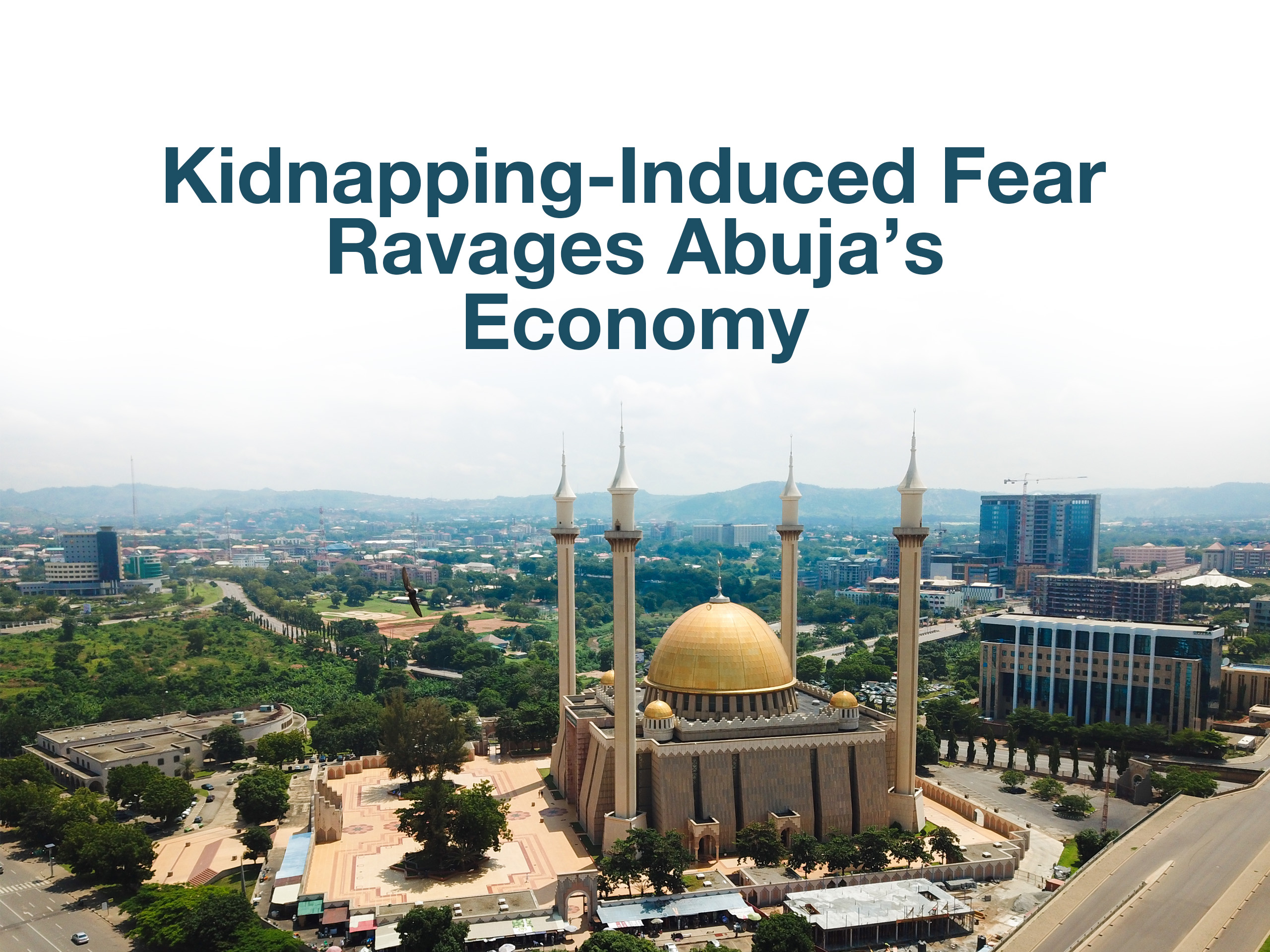Kidnapping-Induced Fear Ravages Abuja’s Economy
Over the years, the issue of kidnapping has been unabated in Nigeria, especially in the Niger Delta and the southeastern region.[1] Freedom House reports that Nigeria recorded one of the highest rates of kidnapping in the world in 2013 (Freedom House, 2014).[2] The kidnapping case has now emerged as a major concern in Abuja, Nigeria’s capital city. Beyond the immediate security threats it poses, kidnapping-induced fear reverberates throughout the city, impacting various aspects of economic activity. This article explores the nuanced effects of kidnapping-induced fear on economic activities in Abuja and offers insights into potential strategies to mitigate its impact.
Abuja, the capital city of Nigeria, has been grappling with a disturbing surge in kidnapping incidents in recent years. Once considered a relative haven, the city’s reputation has been marred by high-profile kidnapping cases, instilling fear and uncertainty among residents and visitors alike. Perpetrators, often operating with impunity, target individuals from all walks of life, ranging from prominent figures to ordinary citizens, in brazen acts of abduction for ransom. Kidnapping by bandits and insurgents is among the most significant organized or gang crimes in Nigeria and is a national security challenge.[3]
About 3,620 persons have been kidnapped, with almost 570 killed during the kidnap incidents in Nigeria between July 2022 and June 2023, with the attacks taking place more in the northwest geo-political zone of the country where bandits also kill residents.[4] Government statistics for Abuja show 40 kidnapping cases involving 236 victims between January 2021 and June 2023. Hardly any kidnappings had been reported in Abuja in the ten months before a man and his six daughters were forced from their home.[5]
This alarming trend has not only shattered the sense of security within the community but also sent shockwaves through the local economy, prompting businesses to reevaluate their operations and potential investors to think twice before committing to the region. Understanding the multifaceted impact of kidnapping on economic activities in Abuja is paramount to devise effective strategies to address this pressing issue.
The occurrence of kidnapping in the region is intricately linked to a nexus of socio-economic, political, and security dynamics. Socio-economic disparities, characterized by widespread poverty and unemployment, drive individuals to resort to kidnapping as a means of financial gain or survival. Weak governance, corruption, and impunity exacerbate the problem by allowing criminal elements to operate with impunity, undermining public trust in the justice system. Moreover, political instability and conflict provide fertile ground for kidnappers to exploit chaos and insecurity. At the same time, organized criminal networks capitalize on governance gaps and border vulnerabilities to perpetrate kidnappings across borders.
Cultural factors, such as glorifying wealth and materialism, further contribute to kidnapping by incentivizing individuals to pursue illicit means of attaining wealth and social status. Additionally, the perpetuation of kinship networks and loyalty to family ties over adherence to the rule of law may facilitate the commission of kidnappings within communities.
Addressing the multifaceted drivers of kidnapping requires a comprehensive approach that tackles root causes while strengthening law enforcement, promotes good governance, and fosters social cohesion. By addressing these underlying factors, policymakers can work towards creating safer and more secure communities and mitigating the pervasive threat of kidnapping in the region.
The public perception of kidnapping incidents is characterized by heightened fear and insecurity, profoundly impacting social dynamics and everyday life. Each reported case amplifies anxieties, leading to residents’ pervasive sense of vulnerability. This fear permeates various aspects of society, influencing behaviors such as travel patterns, leisure activities, and even employment decisions. Moreover, sensationalized media coverage and rumors amplify fear, exacerbating distrust in public safety institutions. As a result, communities adopt preventive measures, such as curfews and neighborhood watch groups, to mitigate perceived risks. The prevalence of kidnapping-induced fear underscores the urgent need for comprehensive security measures and community engagement initiatives to rebuild trust, enhance public safety, and restore a sense of normalcy to affected regions.
The economic impact of kidnapping-induced fear is multifaceted and far-reaching. The tourism and hospitality industry experiences a significant downturn, with fewer tourist visits and hotel bookings observed, alongside adverse effects on restaurants, entertainment venues, and other hospitality businesses. There is a notable decline in business investment and expansion in Abuja as businesses express reluctance to invest or expand operations due to security concerns, ultimately affecting job creation and hindering economic growth. Daily economic activities are disrupted as fear of kidnapping prompts changes in consumer behavior, with individuals avoiding certain areas or activities perceived as high-risk, further exacerbating the economic challenges faced in the region.
The government must prioritize addressing kidnapping in neighboring states, as failure to do so has allowed the problem to extend into the Federal Capital Territory (FCT). The spread of criminal activities to the FCT could have been prevented by effectively tackling kidnapping in surrounding regions.[6]
Addressing kidnapping-induced fear requires a multifaceted approach involving proactive law enforcement, community engagement, and targeted policy interventions. The government must prioritize public safety and security, and invest in effective law enforcement strategies, intelligence gathering, and crisis response capabilities. Additionally, comprehensive public awareness campaigns can educate residents about safety measures and empower communities to collaborate with law enforcement agencies in combating kidnapping and related crimes.
Kidnapping-induced fear is a significant threat to economic activities in Abuja, impacting consumer behavior, investment decisions, and tourism prospects. Addressing this challenge requires coordinated efforts from the government, law enforcement agencies, businesses, and civil society organizations. By prioritizing public safety, enhancing security measures, and fostering community resilience, Abuja can mitigate the adverse effects of kidnapping-induced fear and promote sustainable economic growth and development.



